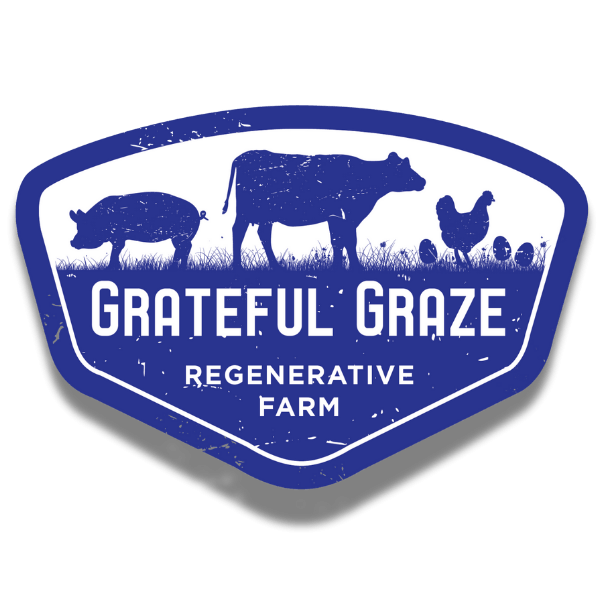Protocols
Home Grown and Ground Feed
We raise our crops on healthy long-term no-till and cover cropped soils. We use our own Non-GMO Corn and Non-GMO Soybeans that we have roasted. We never spray glyphosate (RoundUp) on these crops. We do not use neonicotinoid insecticide seed treatments or sprays. We do not use any fungicide sprays on our crops. Our cover crops assist with weed control and greatly reduce the need for powerful herbicides. The herbicides that we use for weed control are selected for crop safety and cover crop compatibility. We do use a biologically based nutrient program that greatly reduces the need for synthetic fertilizers and enables dramatically improved soil health characteristics. You can learn more at: https://www.power2gro.com/
After raising and storing our crops, we test their nutrient density and have PhD nutritionists at AgriKing in nearby Fulton, IL formulate the right balanced diet for the animal for its age and weight. We purchase their Organic vitamins, minerals, and probiotics and then mix with our home grown grains. By grinding and mixing our feed on our farm, we know EXACTLY what goes into and it is the freshest possible.
Very few other farms can trace their feed ingredients back to the soil it came from!
Timber Raised Pigs
Our pigs are raised in timber which is a habitat that they are adapted to. We move them to new areas (paddocks) on a regular basis. They forage for nuts, leaves, grass, and literally root for roots. As they forage, they are controlling invasive species and opening up the canopy for more native grasses to grow. Our pigs have lots of room to act like pigs. We keep 100 pigs per acre which means each pig has 436 square feet compared to a small 8 square feet in a modern confinement building. They have 50 times the room to roam and we think they taste over 50 times better, too!
Heritage Breed Pigs
We select heritage breeds such as Berkshire because they are adapted to being outdoors. Hot or cold, rain or shine, our pigs simply do not get sick and are well adapted to outdoor living. Heritage breeds have higher fat content than modern confinement hogs which have been selected for leanness. This rich flavorful fat is great for you because the fat is where many key nutrients are stored.
NO Antibiotics
None of the meat or eggs that we sell has ever received an antibiotic treatment.
Industrial farming has been known to add low dose rates of antibiotics to feed rations as a preventative treatment and as a way to increase rate of gain. We believe that low-dose antibiotics can lead to antibiotic resistance not only in the animals that receive it but also the potential to increase resistance in people.
We do administer antibiotics to our animals in the case of an injury or illness that threatens the life or welfare of the animal. When we do that, we tag the animal and process it for consumption ourselves (we normally have 1 a year which isn't enough to feed our hungry crew!), or we sell the animal wholesale at an auction barn. While we do not consider this harmful at all to consume with the appropriate withdrawal time, we DO NOT process this for sale to our customers.
NO Hormones
No Added Hormones. (We are required to say "added" because animals naturally have hormones.)
We have never used added hormones. No implants, no eartags, nor no hormone injections to enhance weight gain or synchronize breeding. We believe bulls should do the job of making calves, not hormone injections and people with gloves and semen straws.
Non-GMO
90-95% of the Corn and Soybeans grown locally are a GMO (Genetically Modified Organism). Genes from outside of the Corn or Soybean genome are added to create herbicide and insect resistance.
Many GMO Corn and Soybean Crops are genetically engineered to be sprayed with a herbicide that would normally kill a natural plant. These chemistries include glyphosate (RoundUp), glufosinate (Liberty), dicamba (Xtendimax), 2,4-d (Enlist). In addition to links to chronic human health effects, soil health and off target crops and trees can be damaged.
Many GMO Corn crops are also genetically engineered to produce one or multiple proteins that kill insect larvae such as European Corn Borer, Corn Rootworm, and Corn Earworm. These pests can create a great amount of damage and can require application of insecticides in an unbalanced system. However, chronic human health effects, soil biology effects, and animal effects have been noted as unintended consequences of their use.
We use no-till, cover crops, crop rotation and grazing to reduce weed challenges. We also use biologically based nutrient products which fortify plants to resist pests without the need for GMO.
Events at the Farm
We love to have folks come see the way we farm, view the animals firsthand, and have a chance to ask questions and simply enjoy nature. Throughout the year we offer several opportunities to be a part of regenerative farming and dive deeper into understanding how we raise your food at Grateful Graze.
